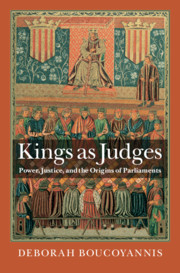Book contents
- Kings as Judges
- Kings as Judges
- Copyright page
- Contents
- Figures
- Tables
- Preface and Acknowledgments
- Part I The Origins of Representative Institutions: Power, Land, and Courts
- Part II The Origins of Representative Practice: Power, Obligation, and Taxation
- Part III Trade, Towns, and the Political Economy of Representation
- 7 Courts, Institutions, and Cities: Low Countries and Italy
- 8 Courts, Institutions, and Territory: Catalonia
- 9 The Endogeneity of Trade: The English Wool Trade and the Castilian Mesta
- Part IV Land, Conditionality, and Property Rights
- Part V Why Representation in the West: Petitions, Collective Responsibility, and Supra-Local Organization
- Bibliography
- Index
9 - The Endogeneity of Trade: The English Wool Trade and the Castilian Mesta
from Part III - Trade, Towns, and the Political Economy of Representation
Published online by Cambridge University Press: 18 June 2021
- Kings as Judges
- Kings as Judges
- Copyright page
- Contents
- Figures
- Tables
- Preface and Acknowledgments
- Part I The Origins of Representative Institutions: Power, Land, and Courts
- Part II The Origins of Representative Practice: Power, Obligation, and Taxation
- Part III Trade, Towns, and the Political Economy of Representation
- 7 Courts, Institutions, and Cities: Low Countries and Italy
- 8 Courts, Institutions, and Territory: Catalonia
- 9 The Endogeneity of Trade: The English Wool Trade and the Castilian Mesta
- Part IV Land, Conditionality, and Property Rights
- Part V Why Representation in the West: Petitions, Collective Responsibility, and Supra-Local Organization
- Bibliography
- Index
Summary
The final chapter in Part III examines more directly the claim that parliaments are a consequence of commercial activity by looking at two cases, which have dominated especially neo-institutionalist accounts due to their thriving wool trades, England and Castile. The main mechanism tying trade to representative institutions is that of capital mobility, which is assumed to endow mercantile groups with bargaining powers. The section on England shows that taxes on mobile capital were not key for representation, as they were not bargained for in Parliament. Indirect taxation was also far less than direct taxation in the critical period of parliamentary emergence. Moreover, bargains that did occur resulted in sectoral privileges, not constitutional gains. In fact, the chapter shows how mercantile interests and the collective action of merchants were endogenous to state capacity. The section on the Castilian Mesta shows how the assumed inefficiencies of this commercial system can be traced to the political weakness highlighted in chapter 5.
- Type
- Chapter
- Information
- Kings as JudgesPower, Justice, and the Origins of Parliaments, pp. 195 - 204Publisher: Cambridge University PressPrint publication year: 2021

